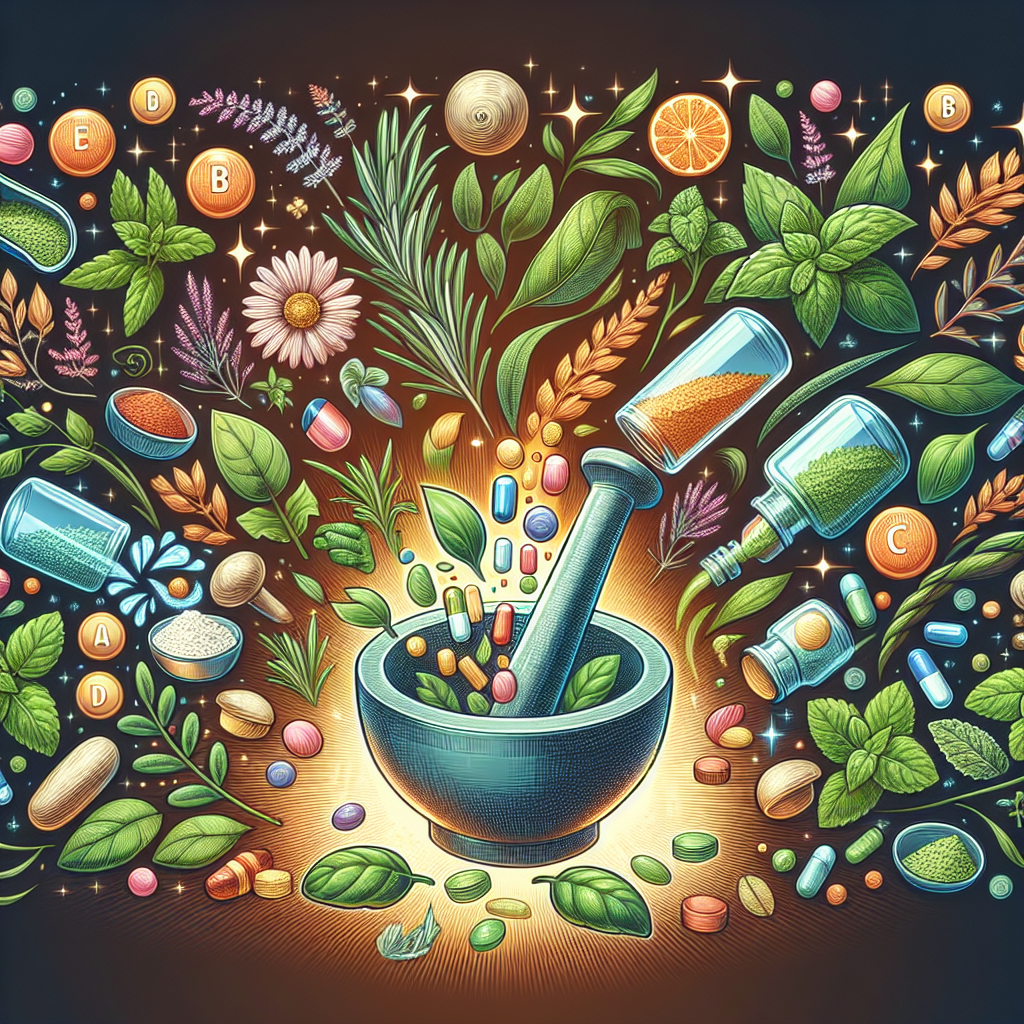Combining Herbs and Vitamins for Optimal Health

Discover the power of combining herbs and vitamins for optimal health. Learn more about the benefits, the right combinations, and how to incorporate them into your daily routine. Start your journey towards a healthier lifestyle today. Click here to get started.
Maximizing Wellness: The Power of Combining Herbs and Vitamins
The pursuit of optimal health is a journey that requires a comprehensive approach, encompassing not only regular exercise and a balanced diet but also the strategic use of herbs and vitamins. The power of combining herbs and vitamins lies in their ability to complement each other, enhancing overall wellness and helping the body function at its best.
Herbs have been used for centuries in traditional medicine, offering a natural way to support health and wellness. They contain a wide range of bioactive compounds that can have various beneficial effects on the body. For instance, turmeric contains curcumin, a potent antioxidant and anti-inflammatory compound, while ginseng is known for its adaptogenic properties, helping the body resist stressors of all kinds, whether physical, chemical or biological.
On the other hand, vitamins are essential nutrients that the body needs to function properly. They play crucial roles in various bodily processes, from energy production and immune function to blood clotting and maintaining healthy skin and eyes. For example, vitamin C is a powerful antioxidant that can boost the immune system, while vitamin D is essential for bone health and has been linked to improved mood and cognitive function.
When combined, herbs and vitamins can work synergistically, enhancing each other’s effects and providing a more comprehensive approach to health and wellness. For instance, combining turmeric with vitamin C can enhance the antioxidant effects of both, helping to protect the body from damage by harmful free radicals. Similarly, combining ginseng with vitamin B complex can enhance energy production and help the body better resist stress.
However, it’s important to note that not all herbs and vitamins can be combined safely. Some combinations can interact negatively, leading to adverse effects or reducing the effectiveness of one or both components. For instance, St. John’s wort, a herb often used for its antidepressant effects, can interfere with the absorption of many vitamins and other nutrients, while high doses of vitamin C can interfere with the absorption of vitamin B12.
Therefore, it’s crucial to consult with a healthcare professional before starting any regimen that combines herbs and vitamins. They can provide guidance on safe and effective combinations, taking into account your individual health needs and any medications you may be taking.
In conclusion, the strategic combination of herbs and vitamins can be a powerful tool in the pursuit of optimal health. By complementing each other, they can provide a more comprehensive approach to wellness, supporting various bodily functions and helping to protect against a wide range of health issues. However, it’s important to use them wisely and under the guidance of a healthcare professional, to ensure safety and effectiveness. With the right approach, combining herbs and vitamins can help you maximize your wellness and live a healthier, more vibrant life.
The Ultimate Guide to Mixing Herbs and Vitamins for Health Benefits

The pursuit of optimal health is a journey that often leads us to explore various avenues, including the use of herbs and vitamins. These natural substances have been used for centuries to promote wellness and treat various ailments. However, the key to unlocking their full potential lies in understanding how to combine them effectively. This article serves as a guide to mixing herbs and vitamins for health benefits.
Herbs and vitamins, when used correctly, can complement each other to provide a holistic approach to health. For instance, the herb Echinacea is known for its immune-boosting properties, while vitamin C is a potent antioxidant that also supports immune function. When combined, these two can provide a powerful defense against common illnesses like the cold and flu.
However, it’s important to note that not all herbs and vitamins can be mixed indiscriminately. Some combinations can lead to adverse effects or reduce the effectiveness of one or both components. For example, the herb St. John’s Wort can interfere with the absorption of many vitamins and minerals, including iron and zinc. Therefore, it’s crucial to do your research or consult with a healthcare professional before starting any new regimen.
One of the most effective ways to combine herbs and vitamins is by focusing on a specific health goal. For instance, if you’re looking to improve your heart health, you might consider combining hawthorn, an herb known for its cardiovascular benefits, with Coenzyme Q10, a vitamin-like substance that helps produce energy in cells and has antioxidant effects. This combination can help improve heart function and protect against heart disease.
Similarly, if you’re dealing with stress or anxiety, you might find relief in a combination of the herb valerian and vitamin B complex. Valerian has been used for centuries to promote relaxation and sleep, while B vitamins are known to support the nervous system and help the body cope with stress.
When combining herbs and vitamins, it’s also important to consider the form in which you’re taking them. Some herbs and vitamins are more effective in certain forms. For example, turmeric, a potent anti-inflammatory herb, is best absorbed when taken with black pepper or fat. Meanwhile, fat-soluble vitamins like A, D, E, and K are best taken with a meal to enhance absorption.
In conclusion, combining herbs and vitamins can be a powerful way to enhance your health and wellbeing. However, it’s essential to approach this practice with knowledge and caution. Always do your research, consider your specific health goals, and consult with a healthcare professional if needed. By doing so, you can harness the power of these natural substances and pave the way for optimal health.
Exploring the Synergy of Herbs and Vitamins for Optimal Health
The pursuit of optimal health is a journey that requires a holistic approach, encompassing not only physical activity and a balanced diet but also the incorporation of beneficial supplements. Among these, herbs and vitamins stand out as two of the most potent sources of health-enhancing properties. When combined, they can create a synergy that significantly boosts overall health and wellness.
Herbs have been used for centuries in traditional medicine, offering a wide range of health benefits. From boosting the immune system to reducing inflammation and managing chronic diseases, herbs are a natural powerhouse of wellness. On the other hand, vitamins are essential nutrients that our bodies need to function correctly. They play crucial roles in various bodily functions, including energy production, immune function, and bone health.
The combination of herbs and vitamins can create a potent mix that enhances the benefits of each. This synergy is not merely an additive effect but a multiplicative one. The herbs can enhance the absorption and efficacy of the vitamins, while the vitamins can help to potentiate the health benefits of the herbs.
For instance, consider the combination of turmeric and vitamin D. Turmeric is a potent anti-inflammatory herb that also has antioxidant properties. Vitamin D, on the other hand, is essential for bone health and immune function. When combined, these two can enhance each other’s benefits. The curcumin in turmeric can help to increase the absorption of vitamin D, while vitamin D can enhance the anti-inflammatory effects of turmeric.
Another example is the combination of St. John’s Wort and vitamin B complex. St. John’s Wort is a popular herb used for its mood-enhancing properties, while the B vitamins are known for their role in energy production and mental function. When used together, they can help to boost mood and energy levels, providing a natural solution for those dealing with stress or depression.
However, it’s important to note that not all herbs and vitamins can be combined safely. Some combinations can lead to adverse effects or reduce the efficacy of one or both components. For instance, St. John’s Wort can interfere with the effectiveness of certain medications, including some types of birth control and antidepressants. Therefore, it’s crucial to consult with a healthcare professional before starting any new supplement regimen.
Moreover, the quality of the herbs and vitamins used is also of utmost importance. Not all supplements are created equal, and some may contain fillers, additives, or low-quality ingredients that can reduce their effectiveness or even pose health risks. Therefore, it’s essential to choose high-quality, reputable brands when purchasing supplements.
In conclusion, the synergy of herbs and vitamins can offer a powerful boost to overall health and wellness. By carefully selecting and combining these natural supplements, individuals can enhance their health in a holistic and natural way. However, it’s crucial to consult with a healthcare professional and choose high-quality supplements to ensure safety and effectiveness. The journey to optimal health is a lifelong one, but with the right tools and knowledge, it can be an enjoyable and rewarding journey.